WASHINGTON, D.C. -- The image of U.S. leadership worldwide was weaker during President Barack Obama's fourth year in office than at any point during his first administration. Median approval of U.S. leadership across 130 countries stood at 41% in 2012, down measurably from 49% approval in Obama's first year. Despite these poorer scores, approval ratings for the most part remain stronger than they were at the end of the last Bush administration.
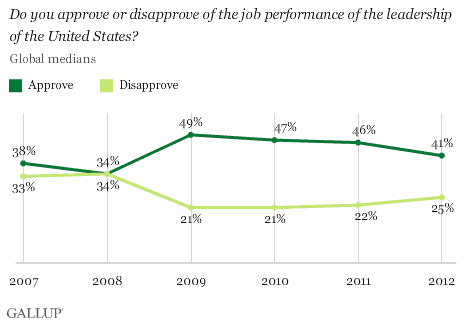
This shift suggests that the president and the new secretary of state may not find global audiences as receptive to the U.S. agenda as they have in the past. In fact, they may even find even once-warm audiences increasingly critical. The image of U.S. leadership continued to be the strongest worldwide in Africa in 2012, bolstered by strong majority approval in sub-Saharan Africa. However, this strong support in the subcontinent, which first showed signs of weakening in 2011, waned more in 2012.
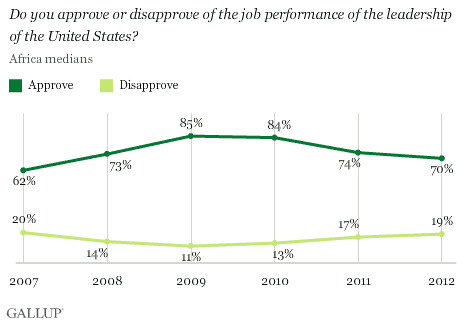
U.S. leadership remains far less popular in North Africa, except in Libya, where U.S. support for the revolution may have generated an almost unprecedented level of goodwill toward America. A majority of Libyans (54%) surveyed before the attack in Benghazi approved of U.S. leadership in 2012. In Morocco, Algeria, Tunisia, and Egypt, no more than one-third approved and ratings remained mostly flat. Algerian approval of U.S. leadership is down slightly since 2011, dropping from 37% to 30%.
U.S. Image Stabilizes in the Americas
The free fall in U.S. approval in the Americas that began after Obama's first year in office ended in his fourth year. Median approval was stagnant at 40% between 2011 and 2012, but the U.S. image remains better positioned now than before the president began his first term.
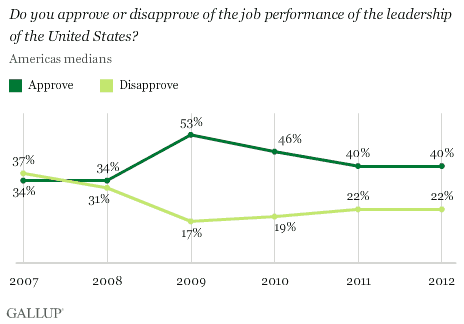
There were no major declines in any Latin American or Caribbean country surveyed in 2012. There were double-digit increases in three, including key U.S. partner and neighbor Mexico. While the 37% of Mexicans who approve of U.S. leadership is slightly lower than the median for the region, it is still an 11-percentage-point increase from 26% approval in 2011. Some of the increase may stem from Mexicans' optimism about future U.S.-Mexican relations after Obama welcomed then-President-elect Enrique Pena Nieto to the White House in late November 2012 and pledged cooperation on trade and immigration reform.
European Approval Slips Among Economic Turmoil
Median approval of U.S. leadership in Europe has slipped 11 points since Obama's first year in office but was still twice as high in 2012 as it was during the last years of the Bush administration. Half of the loss took place in the last year alone, suggesting the U.S. was likely shouldering some of the blame for the ongoing financial crisis in Europe. A median of 36% approved of U.S. leadership last year, down from 42% in 2011.
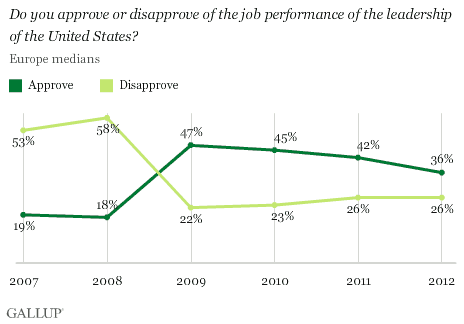
Losses in approval largely outnumbered any gains in Europe, but ratings in many countries remained stagnant. The U.S. retained majority support in six countries in 2012 that span several regions: Kosovo, Albania, Ireland, the United Kingdom, the Netherlands, and Italy.
However, U.S. leadership failed to regain favor in countries such as France, Spain, and Sweden, where approval fell below the majority level in 2011 and stayed there in 2012. Further, views of U.S. leadership continued to worsen in some countries hard hit by the economic crisis, suffering double-digit losses in Hungary, Croatia, Macedonia, and Austria. Russia replaced Serbia in 2012 as the European country with the lowest approval of U.S. leadership (13%).
Approval Edges Downward in Asia
Although the Obama administration shifted its foreign policy focus to Asia in 2011, Gallup's surveys found ratings heading in a negative direction 2012. The 37% median approval in 2012 was still higher than any rating during the Bush administration.
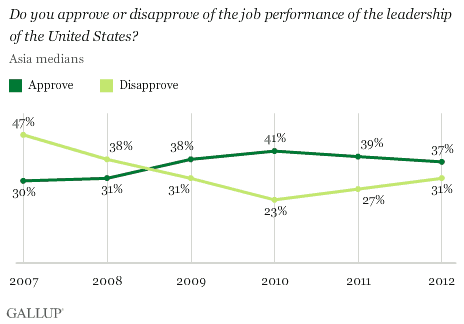
Views of U.S. leadership varied a great deal across Asia in 2012. Ratings in most of the region tended to be more positive than negative, except for the Middle East and parts of South Asia, where residents were still more likely to disapprove than approve.
In fact, most of the countries with the highest disapproval ratings worldwide are in the Middle East and South Asia. More than three in four residents in Pakistan (79%) and the Palestinian Territories (77%) disapproved of U.S. leadership in 2012. Pakistanis' disapproval soared 30 points between 2012 and 2011, amid an increase in drone attacks and massive protests against an anti-Islam film in late September 2012.
More Losses in 2012
While U.S. leadership lost measurable support in more countries in 2011 than in 2012, approval of U.S. leadership still dropped substantially -- 10 points or more -- in 13 countries in 2012.
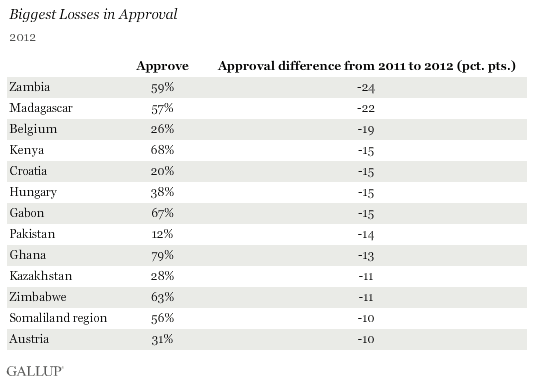
Gains Do Not Offset Losses
U.S. leadership approval made substantial gains in 11 countries in 2012, but gains in only four countries -- Chad, Bangladesh, Mexico, and Haiti -- offset some of the losses in approval in these same countries in 2011.
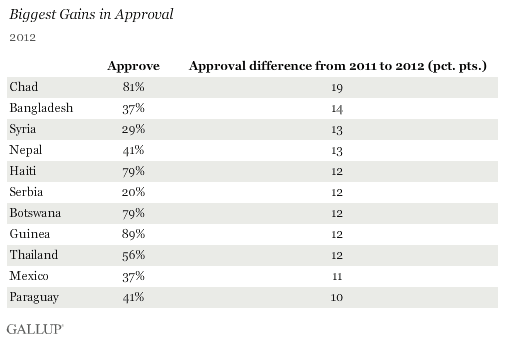
Implications
U.S. leadership faces increasing challenges as it attempts to build engagement worldwide, and in many places, this job may be even tougher than it has been in the past. U.S. leadership thus far has been unable to recoup the favor it lost among audiences in key countries in 2011 and has continued to lose support in many places.
Read the complete findings from the U.S.-Global Leadership Project.
For complete data sets or custom research from the more than 150 countries Gallup continually surveys, please contact us.
Survey Methods
Results are based on face-to-face and telephone interviews with approximately 1,000 adults, aged 15 and older, conducted throughout 2011 in 136 countries and 2012 in 130 countries. Measures based on aggregates of multiple surveys conducted in 2011 and 2012 are noted in the report. For results based on the total samples, one can say with 95% confidence that the margin of sampling error ranges from ±1.7 percentage points to ±4.8 percentage points. The margin of error reflects the influence of data weighting. In addition to sampling error, question wording and practical difficulties in conducting surveys can introduce error or bias into the findings of public opinion polls.
For more complete methodology and specific survey dates, please review Gallup's Country Data Set details.

